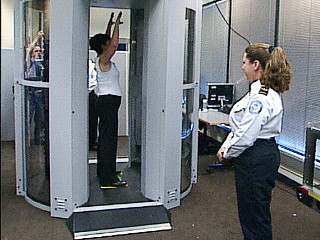We seem to be getting mixed messages today about the use of body scanners in Canada.
The Privacy Commissioner of Canada conducted two Privacy Impact Assessments (PIAs) for the Canadian Air Transport Security Association (CATSA) to assess the impact of whole body scanners.
Assistant Privacy Commission Chantal Bernier said in a speech in Ottawa on October 30, 2009,
…we consider this technology to be inherently sensitive as it reveals an outline of the traveller’s body. Many people may perceive it as privacy invasive.
Pulat Yunusov has noted earlier that the personal privacy issues may not necessarily be as significant, given the low resolution and identity controls around the imaging.
Of greater concern is which individuals are selected for body scans. Bernier allayed these concerns as well in the same speech,
…the technology will be used only for secondary purposes, after an individual has already passed through the metal detector. What’s more, the scans will be voluntary, with passengers given the option of going through them, or having a physical pat-down.
Bernier repeated these criteria today in comments to the press, stating that it is only for those who have failed the metal detector test.
However, Rob Merrifield, Junior Transport Minister, stated in a joint conference with John Baird,
Travelers who are selected for secondary screening will be asked to walk through the wave scanner…
[emphasis added]
Although Merrifield did mention the alternative physical search, the metal detector is conspicuously absent – at least in media reports of the conference.
Removing the metal detector component of secondary screening makes the scans no longer voluntary. It also introduces a significant amount of arbitrariness and discretion into their use, making them subject to abuse.
Anyone compelled to go through a body scan without failing a metal detector test, or not informed of the alternative physical search if they do, should issue a complain while citing the PIA guidelines. At the very least, the Ministers should clarify what the criteria are for using the body scanners to avoid confusion among the public and by security officials.
Ministers of the opposition parties have noted that typically an issue like this would go before a Parliamentary committee, where such clarification would likely be sought.
But that’s right, we can’t do that because with have a Prime Minister that would prorogue politics over our safety.


I doubt the type of scanner pictured above would have been able to discern the powedered explosives hidden in the Nigerian terrorists underwear. Hopefully, we won’t rely on these scanners to keep us safe. We need to follow the Israeli example; look at behaviours and don’t be afraid of considering the backgrounds of those who fly. If that means “racial” profiling, so be it. Use the resources where they will provide the most good. The Israeli’s haven’t suffered a terrorist attack on an El Al airliner since 1972…so what they are doing works, though some will scream discrimination in any event. Time for some common sense.
I agree that the scanners are unlikely to discover this type of material.
I disagree with following the example you cite, as they have been the least successful in mitigating threats when indices beyond incidents are examined, i.e. continued and even elevated threats. My views on this are elaborated upon over on Volokh (scroll down).
Dark-skinned Jews (and others) such as these Canadians are often caught in such profiles, which may in part be the reason why the Canada-Israel Committee has outright rejected any such measures. Quite simply, they don’t work. They often make things worse.
It’s not the right model for America, and not the right model for Canada either.
Thanks so much for this blog. I too have been confused by several media outlets that appear to have missed this very important ommission of detail. I will be travelling to the US in less than two weeks and will certainly be interested in what I find.